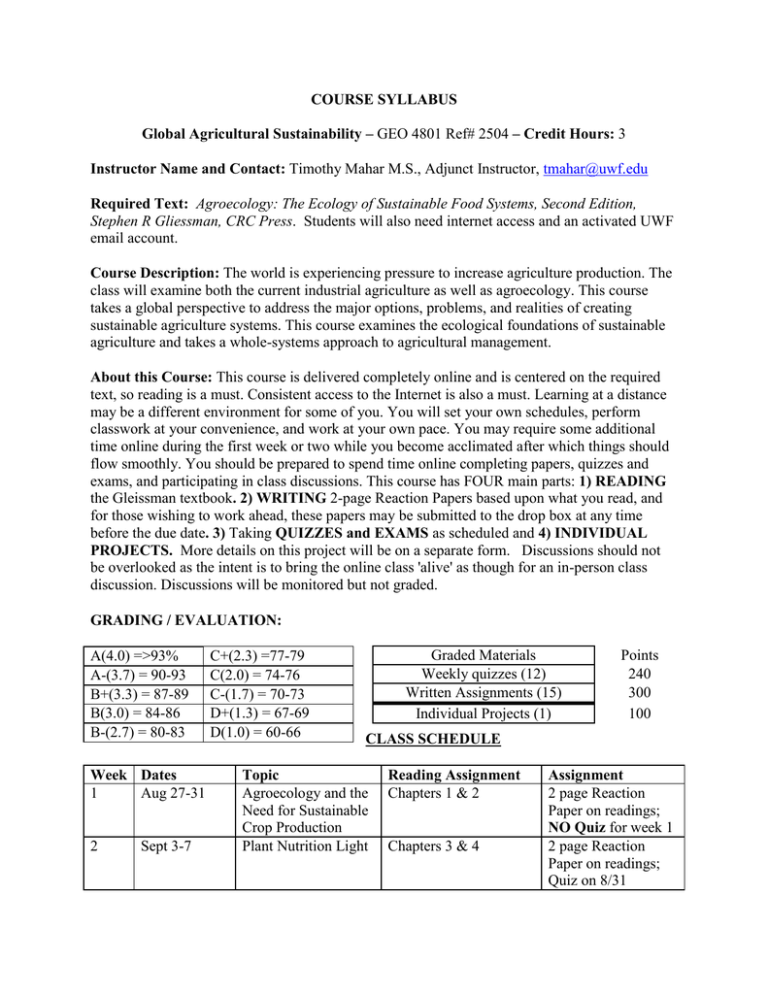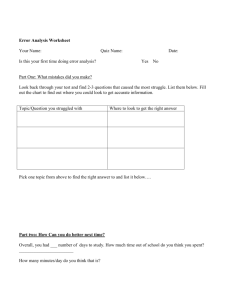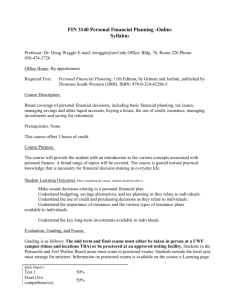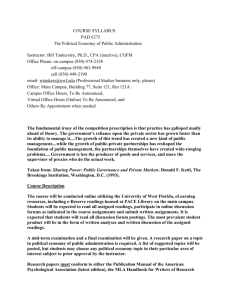COURSE SYLLABUS Global Agricultural Sustainability – GEO 4801
advertisement

COURSE SYLLABUS Global Agricultural Sustainability – GEO 4801 Ref# 2504 – Credit Hours: 3 Instructor Name and Contact: Timothy Mahar M.S., Adjunct Instructor, tmahar@uwf.edu Required Text: Agroecology: The Ecology of Sustainable Food Systems, Second Edition, Stephen R Gliessman, CRC Press. Students will also need internet access and an activated UWF email account. Course Description: The world is experiencing pressure to increase agriculture production. The class will examine both the current industrial agriculture as well as agroecology. This course takes a global perspective to address the major options, problems, and realities of creating sustainable agriculture systems. This course examines the ecological foundations of sustainable agriculture and takes a whole-systems approach to agricultural management. About this Course: This course is delivered completely online and is centered on the required text, so reading is a must. Consistent access to the Internet is also a must. Learning at a distance may be a different environment for some of you. You will set your own schedules, perform classwork at your convenience, and work at your own pace. You may require some additional time online during the first week or two while you become acclimated after which things should flow smoothly. You should be prepared to spend time online completing papers, quizzes and exams, and participating in class discussions. This course has FOUR main parts: 1) READING the Gleissman textbook. 2) WRITING 2-page Reaction Papers based upon what you read, and for those wishing to work ahead, these papers may be submitted to the drop box at any time before the due date. 3) Taking QUIZZES and EXAMS as scheduled and 4) INDIVIDUAL PROJECTS. More details on this project will be on a separate form. Discussions should not be overlooked as the intent is to bring the online class 'alive' as though for an in-person class discussion. Discussions will be monitored but not graded. GRADING / EVALUATION: A(4.0) =>93% A-(3.7) = 90-93 B+(3.3) = 87-89 B(3.0) = 84-86 B-(2.7) = 80-83 Week Dates 1 Aug 27-31 2 Sept 3-7 C+(2.3) =77-79 C(2.0) = 74-76 C-(1.7) = 70-73 D+(1.3) = 67-69 D(1.0) = 60-66 Graded Materials Weekly quizzes (12) Written Assignments (15) Individual Projects (1) Points 240 300 100 CLASS SCHEDULE Topic Agroecology and the Need for Sustainable Crop Production Plant Nutrition Light Reading Assignment Chapters 1 & 2 Chapters 3 & 4 Assignment 2 page Reaction Paper on readings; NO Quiz for week 1 2 page Reaction Paper on readings; Quiz on 8/31 3 Sept 10-14 Chapters 5 & 6 Sept 17-21 Temperature, Humidity and Rainfall Water & Soil 4 5 Sept 24-28 Wind Chapter 7 6 Oct 1-5 Fire Chapter 10 7 Oct 8-12 Chapters 11 & 12 8 Oct 15-19 Biotic Factors Environmental Complex Disturbance and Succession in Agroecosystems 9 Oct 22-26 Population Ecology Genetic Resources Chapters 13 & 14 10 Oct 29-Nov 2 Chapters 15 & 19 11 Nov 5-9 12 Nov 12-16 Species Interaction Animals in Crop Communities Diversity, Stability and Energetics of Agroecosystems Converting to Agroecology 13 Nov 19-23 Landscape Diversity Thanksgiving Chapter 22 14 Nov 26-30 Sustainable Farming Communities Chapter 23 15 Dec 3-7 Whole System Sustainability Chapter 24 16 Dec 10-14 FINALS WEEK Chapters 8 & 9 Chapter 17 Chapters 16 & 18 Chapters 20 & 21 2 page Reaction Paper on readings; Quiz on 9/7 2 page Reaction Paper on readings; Quiz on 9/14 2 page Reaction Paper on readings; Quiz on 9/21 2 page Reaction Paper on readings; Quiz on 9/28 2 page Reaction Paper on readings; Quiz on 10/5 2 page Reaction Paper on readings: NO mid term exam 10/12 2 page Reaction Paper on readings; Quiz on 10/19 2 page Reaction Paper on readings; Quiz on 10/26 2 page Reaction Paper on readings; Quiz on 11/2 2 page Reaction Paper on readings; Quiz on 11/9 2 page Reaction Paper on readings; NO Quiz on 11/23 2 page Reaction Paper on readings; Quiz on 11/30 2 page Reaction Paper on readings; PROJECTS DUE Quiz on 12/7 NO FINAL EXAM - You have been tested throughout the term. Course Communication: Please post general course or assignment questions to the appropriate Discussion Topic. Please email directly me if you have personal/private questions. Student Learning Outcomes: Upon completion of the course, students will gain: 1). an understanding of the agroecosystem concept and sustainable crop production. 2). an understanding of the global context of cultural and economic sustainability. 3). the ability to effectively transmit written information. 4). the ability to discuss, in an informed manner, current sustainability issues relevant to agriculture. Finally, you may want to incorporate these tips to help you get started: Schedule a time each week to: o Check the course web site to determine your tasks for the week. o Check the course web site throughout the week for updates. Within the first week, become familiar with the site and how to use it. o View this eLearning Demo. Team up with your classmates to discuss class assignments and questions you might have. o Check the “Classlist” link for fellow students emails. Ask questions when you need answers. If you have problems, contact your instructor early. SPECIAL TECHNOLOGY USED BY STUDENTS: This course is 100% online. All instructional content and interaction takes place over the WWW. In addition to baseline word processing skills and sending/receiving email with attachments, students will be expected to search the internet and upload / download files. In addition, students may need one or more of the following plug-ins: Adobe Acrobat Reader: http://www.adobe.com/products/acrobat/readstep2.html PowerPoint Viewer: http://www.microsoft.com/downloads/details.aspx?FamilyID=048DC840-14E1-467D8DCA-19D2A8FD7485&displaylang=en Windows Media Player: http://www.microsoft.com/windows/windowsmedia/download/ QuickTime Player: http://www.apple.com/quicktime/download/ Real Player: http://forms.real.com/netzip/getrde601.html?h=softwaredl.real.com&dc=828827826&f=windows/installer/player/R51R01F/RealPlayerSPGold.ex e%20&p=RealOne+Player&&oem=dl&dist=&tagtype=ie&type=dl Adobe Flash Player: http://get.adobe.com/flashplayer/ EXPECTATIONS FOR ACADEMIC CONDUCT/PLAGIARISM POLICY: Academic Conduct Policy: (Web Site) | (PDF Format) | Plagiarism Policy: (WORD Format) | UWF Library Online Tutorial: Plagiarism | Student Handbook: (PDF Format) ASSISTANCE FOR STUDENTS WITH SPECIAL NEEDS: Students with special needs who require specific accommodations for examinations or other course activities should contact the Student Disability Resource Center (SCRC) (web address: http://www.uwf.edu/SDRC, telephone: 474-2387). SDRC will provide the student with a letter for the instructor that will specify recommended accommodations for individual students. WEATHER EMERGENCY INFORMATION In the case of severe weather or other emergency, the campus might be closed and classes cancelled. Official closures and delays are announced on the UWF website and broadcast on WUWF-FM. Weather Emergency Information WUWF-FM (88.1MHz) is the official information source for the university. Any pertinent information regarding closings, cancellations, and the reopening of campus will be broadcast. In the event that hurricane preparation procedures are initiated, the UWF Home Web Page and Argus will both provide current information regarding hurricane preparation procedures, the status of classes and the closing of the university. Emergency plans for the University of West Florida related to weather or other emergencies are available on the following UWF web pages: Information about hurricane preparedness plans is available on the UWF web site: http://uwfemergency.org/hurricaneprep.cfm. Information about other emergency procedures is available on the UWF web site: http://uwfemergency.org/ IMPORTANT NOTICE UWF is requiring mandatory proctoring of exams beginning with the Fall 2011 term. http://www.uwf.edu/testing/proctored_exam.cfm links to the university testing center and more information is available there. Quizzes in this class are NOT subject to the proctoring requirement but Exams are. The UWF policy can be found here: http://uwf.edu/academic/policies/Proctoring_Policy_for_Exams_in_Online_Courses.pdf






